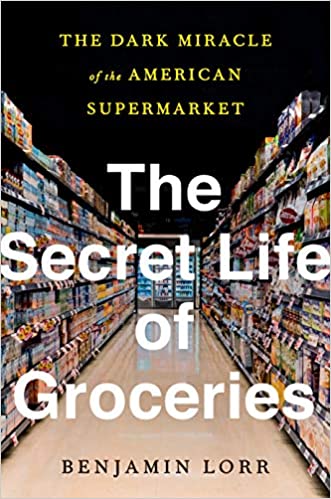You have /5 articles left.
Sign up for a free account or log in.
 The Secret Life of Groceries: The Dark Miracle of the American Supermarket by Benjamin Lorr
The Secret Life of Groceries: The Dark Miracle of the American Supermarket by Benjamin Lorr
Published in September 2020
As with almost everything associated with food, the more you learn, the less you want to know.
A generation of readers has been disturbed by Michael Pollan's unpacking of industrial food (The Omnivore's Dilemma) and Eric Schlosser's adventures in Fast Food Nation.
Now with The Secret Life of Groceries, we can be troubled anew on our next trip to the grocery store.
Benjamin Lorr practices an immersive form of journalism in chronicling the history and current status of the American supermarket. Lorr spends three months working at the fish counter of a New York City Whole Foods. He travels to Thailand to investigate how shrimp are caught, packaged and shipped to American consumers.
In one section of the book, Lorr describes his experience accompanying a band of vegan activists in a late-night break-in at an industrial pig farm.
If you have a romantic view of either Trader Joe's or Whole Foods that you don't wish to disturb, then you might not want to read The Secret Life of Groceries.
If you want to keep believing that an effective strategy to improve the world is to keep buying organic and free-range groceries, maybe skip this book.
However, if you are willing to face up to another disturbing set of realities about how we eat, by all means, dive in.
Two themes running through The Secret Life of Groceries relate to the structural problems plaguing the grocery industry: staffing and supply chains.
The turnover among supermarket employees is over 100 percent. This means that the entire workforce quits and is hired within a year.
For grocery stores, the high turnover rate is less a problem than a necessary feature of the supermarket economy. High turnover is driven by the low wages and scant benefits that most grocery workers receive.
Lorr describes how Whole Foods, like other grocery chains, practices a form of just-in-time scheduling. Workers never know which shifts they will be working. Erratic work schedules also serve to keep employees below the hours worked necessary to receive benefits.
Working at the Whole Foods fish counter, as Lorr discovers, is both physically and mentally exhausting. He also points out that the people working at Whole Foods can't afford to buy what they sell.
Given the low margins (1.5 percent) and high competition among grocery chains, the solution to the supermarket job problem is unlikely to come from the store owners. Higher minimum-wage laws and the separation of health insurance from employment, combined with public investments in things like childcare and affordable housing, are likely what is needed.
The supply chain is the second structural problem with the supermarket industry explored in The Secret Life of Groceries.
Lorr spends time with one of the truck drivers who brings our groceries from the factory to the distributor. Truck driving is among the most dangerous of jobs in the U.S.
The deregulated trucking industry relies on new low-paid trainee drivers to keep shipping prices low. The largest trucking companies run a lucrative business in recruiting new drivers, signing them up to lease-to-own arrangements for trucking rigs and paying meager wages for new drivers.
Turnover in the trucking industry ensures that many drivers on the road will be inexperienced (and low paid), adding to both the danger of the job (and to other drivers) and the financial viability of the trucking industry.
Supply chain problems for the grocery business magnify when the overseas origins of food are closely examined. After reading about the abuses suffered by migrant Thai fishermen in the shrimp industry, you may think twice before buying that next bag of shrimp.
The Secret Life of Groceries also tells the fascinating origin story of Trader's Joes, including its subsequent sale to the secretive billionaire German grocery mogul Theo Albrecht.
Is higher ed like industrial food?
Would it be the case that the more we knew about academia, the less confident we would be about our positive place in the world?
Are contingent faculty the equivalent of low-paid grocery workers and ill-trained truckers?
Do the economics of higher education require schools to engage in a similar race to the bottom of the supermarket industry?
Are there moral equivalencies to be made between the growth of student debt and the questionable global labor practices in which cheap food depends?
Maybe. Maybe not. Probably worth pondering.
Fans of Pollan and Schlosser should add The Secret Life of Groceries to their reading list.
What are you reading?




